
15 minute read
Celebrating Half a Century of the American TFP's Fight For Christian Civilization
BY RAYMOND DRAKE
Fifty years ago, on May 18, 1973, The Foundation for a Christian Civilization, Inc.—the corporate name of the American Society for the Defense of Tradition, Family and Property (TFP)—filed articles of incorporation with New York’s Department of State, and became established as a nonprofit organization.
A few months later, the Internal Revenue Service recognized the new organization’s 501(c)(3) charitable organization status.
With this 1973 legal filing, the handful of concerned American Catholics who had gathered informally around the publication Crusade for a Christian Civilization to defend the principles of tradition, family, and property—essential mainstays of a Christian order—adopted a corporate structure for purposes of civil law.
Earliest Origins
As the years rolled by, many would join the ranks of the TFP’s spiritual crusade. However, Crusade’s first issue in January 1971 began with just two members, John Hart and Philip B. Calder (see interview with Mr. Calder on pages 8–9). Both lived in New York City and had known each other for some time.
In the summer of 1970, John Hart attended an audiovisual presentation given by Dr. José Lúcio Araújo Corrêa, a member of the Brazilian TFP. Dr. Araújo Corrêa’s trip to New York City was one of several that he, Dr. Caio Xavier da Silveira, Mario Navarro da Costa, and other representatives of the Brazilian or Argentine TFPs had made to the United States, starting in 1966. They gave talks and represented their organizations at conservative conferences such as The Wanderer Forum (now The Bellarmine Forum).
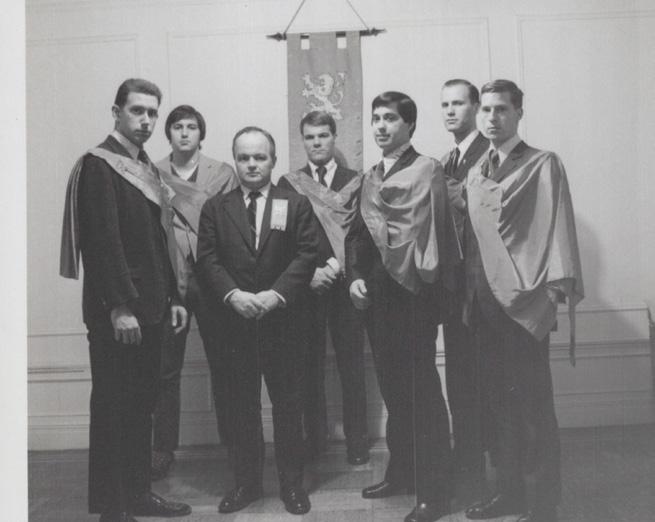
In December 1970, Mr. Hart traveled to Brazil to learn more about the Brazilian TFP’s outlook, principles, and methods of action, and the history of its organized struggle to defend the values of Christian civilization, which Professor Plinio Corrêa de Oliveira, its founder and president, had started in 1928.
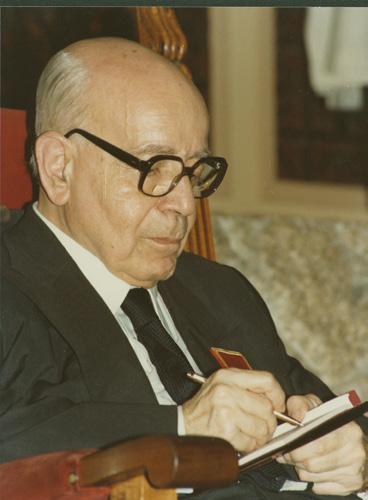
The TFP Apostolate
In a 1951 article, Professor Corrêa de Oliveira would call the TFP’s organized apostolate “The Twentieth Century Crusade.”
Under his leadership, this apostolate was first structured in 1928. In 1933, Professor Corrêa de Oliveira was made director of the publication Legionário. Professor Corrêa de Oliveira called upon his closest followers to form the editorial staff of this journal, which he quickly turned into a national Catholic weekly. In 1947, however, they had to relinquish editorial control in the aftermath of Professor Corrêa de Oliveira's bombshell book, In Defense of Catholic Action, which denounced the neo-modernistic trends appearing within the Church. But Professor Corrêa de Oliveira and his group did not give up. They continued their apostolate and, in 1950, helped launch the monthly Catolicismo, which is still published. It became their new podium.
“[The apostolate] combat[s] the Revolution, that is, more particularly, so-called Catholic leftism in the religious realm and communism in the temporal realm.”
In 1960, with the incorporation of the Brazilian Society for the Defense of Tradition, Family and Property—the first TFP—Professor Corrêa de Oliveira’s apostolate adopted the corporate structure that would define it for the decades ahead.
In 1959, Professor Corrêa de Oliveira wrote his masterpiece, Revolution and Counter-Revolution intention of making it a bedside book for about one hundred young Brazilians . . . the seed of the future TFP.”1 In part two of this essay, he laid out the “principles, goals, and norms” for this apostolate. In 1976, he defined it as an apostolate that “combat[s] the Revolution, that is, more particularly, so-called Catholic leftism in the religious realm and communism in the temporal realm.”2
This struggle always was and continues to be legal and peaceful. Rather than the use of physical weapons, it employs those of the spirit: prayer; the clear expounding of the divine and natural moral laws; the development and presentation of arguments based on faith-enlightened reason, common sense, and logic. It is always grounded in the traditional teachings of the Supreme Magisterium of the Catholic Church, and its goal is to influence and persuade individuals and public opinion to follow them.
Revolution and Counter-Revolution, and the fighting example of Professor Corrêa de Oliveira and the Brazilian TFP, inspired the founding of the American TFP and that of all other TFPs around the world. Together, the twentyfive sister and autonomous TFPs that existed at the time of Professor Corrêa de Oliveira’s death on October 3, 1995, formed the largest network of anti-communist organizations of Catholic inspiration worldwide.
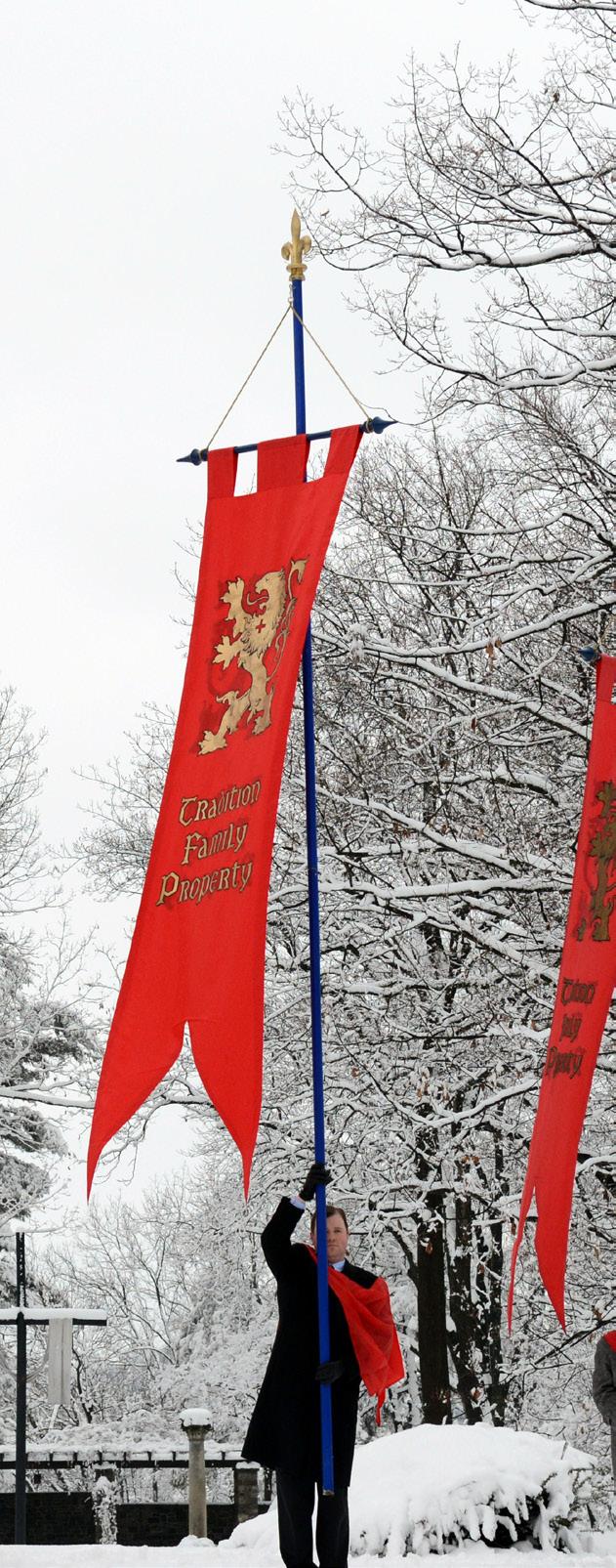
Issues of TFP Involvement During These Fifty Years
While major American TFP milestones would require much space, a general overview of the organization’s activities during these fifty years shows a wide range of topics. This is understandable since the TFP is concerned with everything that touches in one way or another on Christian civilization.
Thus, the American TFP has opposed: contraception; abortion; euthanasia; human cloning; the social acceptance of homosexual practice; anti-discrimination laws that give homosexuals a privileged status; the lifting of “Don’t Ask, Don’t Tell” in the military; homosexual adoption; domestic partnerships, civil unions, and same-sex “marriage;” transgenderism; homosexual films, theater plays, events, and pro-homosexual clubs on Catholic college campuses; public blasphemy; nudism; socialist childcare; socialist healthcare; socialist allocation of federal waters; death taxes; self-managing socialism; international communism; President Carter’s human rights policy; the policy of détente with communist regimes pursued by the American and Western governments; progressivism; liberation theology; the Vatican's policy of Ostpolitik with communist governments; the retroactive lifting of statutes of limitations for civil cases involving clergy sexual abuse; the enactment of State laws forcing clergy to violate the seal of confession in cases of child abuse; the removal of beauty from and the democratization of the Catholic Church; “frenetic intemperance” in the economy; the ecological movement; pacifism; imprudent nuclear disarmament; the Occupy Wall Street movement; Drag Queen Story Hours; and After School Satan Clubs.
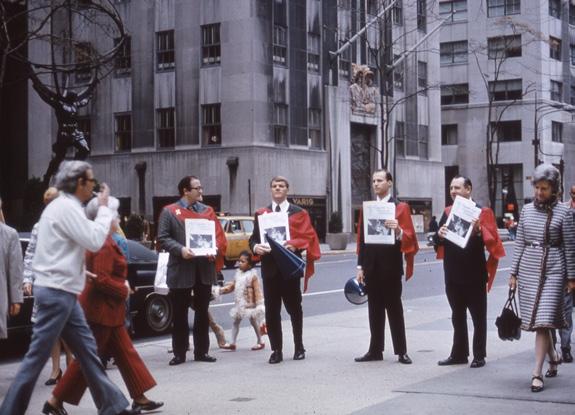
And on the positive side, the American TFP has promoted: a love for Christian heritage; chivalry, social graces, and refinement; an appreciation for healthy and just social inequalities and traditional elites; respect for the flag and the honor of the nation; patriotism; the need for beauty in art and architecture; the right to own firearms; the Fatima message of prayer, penance, and conversion; love of purity and the faith on college campuses; Public Square Rosary Rallies; affirming the Catholic faith in the public square; the Catholic teaching on “just war;” the refusing of Holy Communion to pro-abortion politicians; parental rights; homeschooling; free enterprise and the right to private property; and a sound economy as an integral part of an organic Christian society.
TFP Symbols in Action
In the course of these activities, the American TFP’s symbols have become known to the public at large. Among these symbols are the trademark red standard with its golden rampant lion, the red cape, and the TFP ceremonial habit.
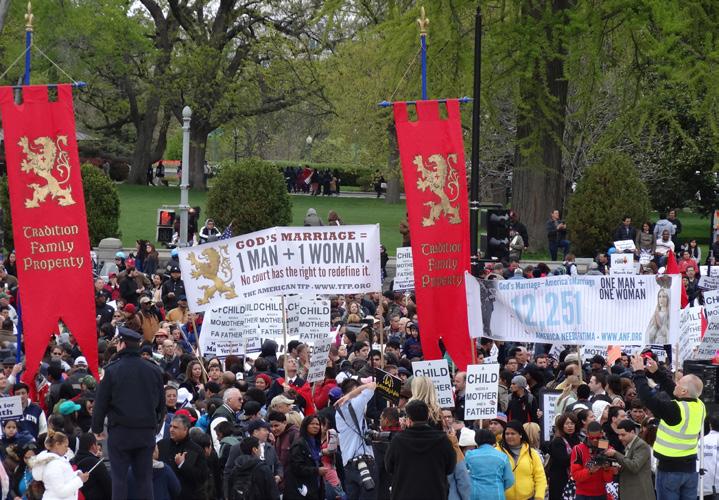
It seems appropriate to register here how even ideological adversaries recognize the impact of these symbols and activism. On November 24, 2003, sophomore Jessica Cisneros wrote a letter to the editor titled “Fight Back,” published by the GW Hatchet, the student newspaper at George Washington University:
Walking to class on Thursday afternoon, I suddenly heard bagpipes and saw the dreaded red sashes. Yes, our good friends, the fanatical members of the American Society for the Defense of Tradition, Family and Property, were yet again on the GW campus. Their mission du jour? Handing out flyers discussing the need to “make homosexuality illegal” and badgering students who, for the most part, want nothing to do with them.
As I walked into the Marvin Center I overheard University police officers discussing the spectacle, wistfully commenting that they could do nothing about the situation because the group was breaking no laws.
I thought about the TFP throughout the day. I support free speech, so I agree that we cannot just throw them off of campus, no matter how offensive they may be. However, I believe the student body needs to mobilize against people and groups such as the TFP.3
National Scope
Since 1993, the American TFP’s headquarters have been in Spring Grove, Pennsylvania. Presently, it has offices in McLean, Virginia; Park Ridge, Illinois; Milwaukee, Wisconsin; Hazleton and Freeland, Pennsylvania; Rossville, Kansas; Orange and San Jose, California; Honolulu, Hawaii; Clermont and Hollywood, Florida; with other centers in Houston and Arlington, Texas; and New Orleans, Louisiana (TFP-Louisiana’s headquarters are in Lafayette, Louisiana). The TFP’s activities during these fifty years have reached all fifty states and the District of Columbia, not just online and by direct mail, but through person-to-person contact.
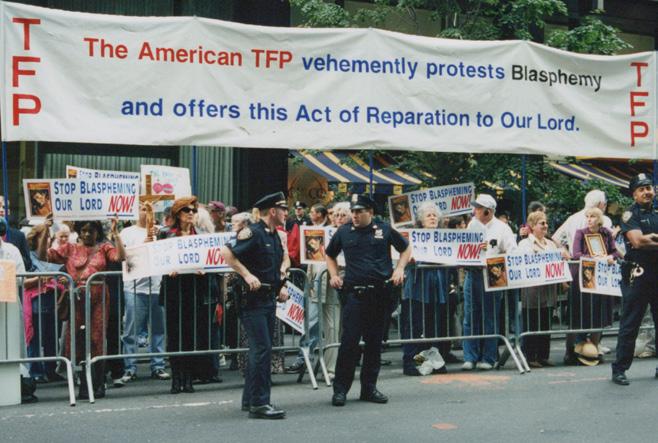
TFP members have done street campaigns in all states, displaying the red cape and golden lion-emblazoned red standard. Two TFP activities involving personal witnesses have also been carried out in every state of the Union, the District of Columbia, and Puerto Rico, namely, the annual Public Square Rosary Rallies held since 2007 and the Fatima home visits made since 1995. Moreover, the Public Square Rosary Rallies extended their reach to the Northern Mariana Islands, Guam, American Samoa, and the U.S. Virgin Islands.
International Activities
During these fifty years, the American TFP has participated in several international joint campaigns with sister autonomous TFPs worldwide. Most notable among these were:
"The Vatican Policy of Détente with Communist Governments—Should the TFPs Stand Down? Or Should They Resist?" (1974);
“What Does Self-Managing Socialism Mean for Communism? A Barrier? Or a Bridgehead?—A Message of the 13 TFPs” (1981–1982);
“Has Communism Died? And What About Anti-Communism? Talking to the Man in the Street” (1989);
“Communism and Anti-Communism on the Threshold of the Last Decade of the Millennium” (1990);
“The Lithuania Campaign” (1990);
“The Book of Nobility Campaign” (1993–1994);
“The Americas on the Dawn of the Third Millennium: Convictions, Apprehensions, and Hopes of the Hemispheric TFPs” (1994);
"I Have Weathered Other Storms Campaign" (2002);
"Defending a Higher Law: Why We Must Resist Same-Sex 'Marriage' and the Homosexual Movement Campaign" (2004);
Public Square Rosary Rallies (2007–ongoing);
“Filial Appeal to His Holiness Pope Francis on the Future of the Family” (2015).
THE WHITE HOUSE WASHINGTON
February 13, 1984
Dear Mr. Spann:
Thank you for your letter of support and for providing me with an up-to-date account of the activities of the American Society for the Defense of Tradition, Family and Property.
With warm regards,
Sincerely,
Ronald Regan
Mr. John R. Spann President American Society for the Defense of Tradition, Family and Property Post Office Box 121 Pleasantville, New York 10570
Washington and Chicago Bureaus
Since 1981, the American TFP’s Washington bureau, under the direction of Mario Navarro da Costa, and, since 1995, its Chicago bureau, under the direction of C. Preston Noell III, have networked with conservative individuals and organizations in the nation’s capital and the Windy City, participating in conferences and meetings and providing information on TFP activities. One of many letters is reproduced here to illustrate the efficacy of this work. (See below left.)
The American TFP and Church Authority
While structured as a nonprofit corporation in the eyes of civil law, from the perspective of Canon Law, the American TFP is simply an independent, non-canonical, de facto association of lay faithful, whose members are subject to the vigilance of the Church hierarchy in matters of faith, morals, and discipline, like all other members of the laity. Thus, its canonical status is the same as that of the Knights of Columbus.4
Notwithstanding this independent, non-canonical status, the American TFP has networked with numerous bishops, priests, and religious during these fifty years and received hundreds of letters of praise and encouragement for one or more of its activities. By way of example, here is a letter from Justin Cardinal Rigali, Archbishop of Philadelphia:
I extend the assurance of my prayers and my solidarity to all those participating in rosary rallies across the nation on October 13 of this year, sponsored by the American Society for Defense of Tradition, Family and Property.
Please convey to the participants my encouragement as they undertake this public witness to their faith in Jesus Christ and their love and devotion to His holy Mother. It is my prayer that this witness be a means of inculcating a true spirit of repentance and conversion in the hearts of all who participate.
May Mary, Our Lady of Fatima, watch over them.
— Justin Cardinal Rigali, Archbishop of Philadelphia
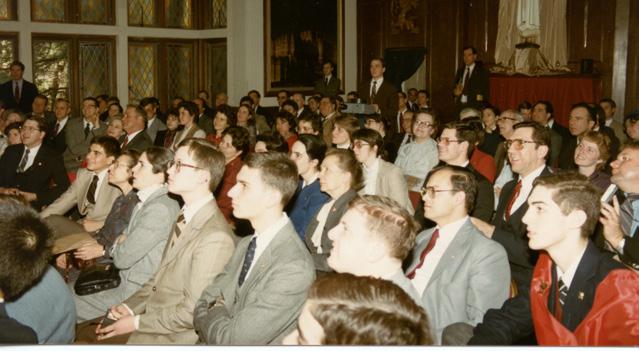
Generous Dedication from Donors and TFP Members
Nothing the American TFP has accomplished during these fifty years would have been possible without the generous contributions from numerous donors—today, 163,000 strong—but special mention is owed to our 30,000 “Child of Mary” monthly donors and, above all, our major benefactors. Among the latter, honorable mention and lasting gratitude must be made to three very dear benefactors that God has called to Himself: Mrs. Virginia Hallinan Tatton, her first cousin, Mrs. Mary O’Connor Braman, and the latter’s son, Daniel. God knows the extent of their unparalleled generosity.
These fifty years also reflect the generous dedication of numerous TFP members, who see their service to the American TFP’s mission and goals as a God-given vocation. Among these TFP members, we gratefully mention twelve whom God has called to eternity: John Hart, Thomas W. Godwin, Jr., Joseph Edward Parrot, Frederick Vincent Porfilio, Daryl Huang, Jeremiah B. Wells, John R. Spann, Charles Laczkoskie, Antonio Fragelli, Edward Ritchie, Howard Whitcraft, and Luiz A. Fragelli. May the Blessed Mother, whose slaves of love (following the method of Saint Louis de Montfort) they were here on earth, be their reward in Heaven.
The TFP's activities also benefited from the countless hours of volunteer service rendered by TFP supporters, friends, and America Needs Fatima campaign members, who gave of themselves generously in street campaigns, protests, and rallies and in personal apostolate with other individuals and families.
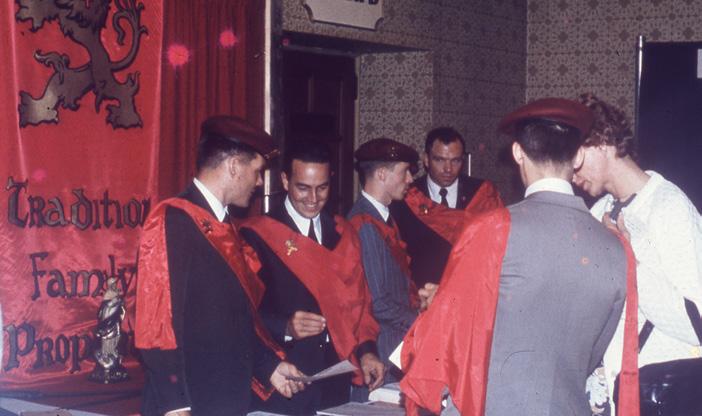
We particularly wish to thank longtime TFP director Mr. Luiz A. Fragelli of good memory. In 1973, the pioneering members starting to organize in the United States wrote to Professor Corrêa de Oliveira asking if he could spare someone from the Brazilian TFP to help their incipient efforts. Professor Corrêa de Oliveira turned to Mr. Fragelli, who without hesitation moved with his wife and young family to the United States and dedicated forty-seven years to building the American TFP and focusing it ever more on its mission.
Especially worthy of gratitude is Professor Corrêa de Oliveira, who started this spiritual crusade in Brazil. From him, TFP members learned the value of organized resistance and the immense and undeserved honor of fighting for the Blessed Virgin Mary. With a moral certainty that he is in Heaven, may he be an intercessor at the feet of Our Lady, for he was most devoted to her during life and struggled valiantly for her cause. May he pray for all—TFP directors, members, supporters, rally captains, donors, and friends—and obtain from Mary Most Holy the urgent fulfillment of her promise at Fatima: “Finally, my Immaculate Heart will triumph!”■
Notes:
1. Plinio Corrêa de Oliveira, Revolution and Counter-Revolution (York, P.A.: The American Society for the Defense of Tradition, Family and Property, 1993), 126.
2. Ibid., 127.
3. Jessica Cisneros, “Fight Back,” GW Hatchet, November 24, 2003, http://www.gwhatchet.com/2003/11/24/letters-to-the-editor-128/ (accessed May 28, 2023).
4. James A. Coriden, An Introduction to Canon Law (Mahwah, N.J.: The Paulist Press, 1991), 69. “Is the Knights of Columbus an Official Part of the Catholic Church?” https://www.kofc.org/en/about/questions/4.html (accessed April 12, 2013).
TFP-Related Corporations
December 1973—Crusade for a Christian Civilization, Inc. was incorporated as a Louisiana nonprofit corporation. In 1982, The Foundation for a Christian Civilization, Inc. (the “Foundation”) assumed its assets and activities, and the corporation was dissolved.
June 1975—The American Society for the Defense of Tradition, Family and Property was incorporated as a New York nonprofit corporation. In 1987, its assets and activities were transferred to the Foundation, and some years later, the corporation merged into the Foundation.
June 1983—Western Hemisphere Cultural Society, Inc. was incorporated as a New York nonprofit corporation. Years later, its activities were assumed by the Foundation, and it became a 509(a)(2) supporting foundation.
June 1993—Tradition, Family, Property, Inc. was incorporated as a New York nonprofit corporation. This corporation established itself with the Internal Revenue Service as a 501(c)(4) social welfare organization.
August 1995—Saint Louis de Montfort Academy, Inc. was incorporated as a Pennsylvania nonprofit, independent religious school.
August 2006—Tradition, Family, Property—Louisiana, Inc. was incorporated as a Louisiana nonprofit and recognized by the Internal Revenue Service as a 501(c)(3) charitable organization.










